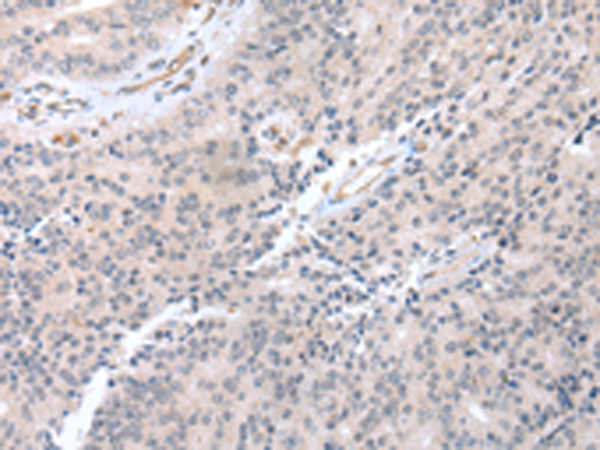
| WB | 咨询技术 | Human,Mouse,Rat |
| IF | 咨询技术 | Human,Mouse,Rat |
| IHC | 1/20-1/100 | Human,Mouse,Rat |
| ICC | 技术咨询 | Human,Mouse,Rat |
| FCM | 咨询技术 | Human,Mouse,Rat |
| Elisa | 1/2000-1/5000 | Human,Mouse,Rat |
| Aliases | GPR2 |
| Host/Isotype | Rabbit IgG |
| Antibody Type | Primary antibody |
| Storage | Store at 4°C short term. Aliquot and store at -20°C long term. Avoid freeze/thaw cycles. |
| Species Reactivity | Human, Mouse |
| Immunogen | Synthetic peptide of human CCR10 |
| Formulation | Purified antibody in PBS with 0.05% sodium azide and 50% glycerol. |
+ +
以下是关于CCR10抗体的3篇代表性文献,包含标题、作者及摘要概括:
---
1. **标题**: *"CCR10 and its ligand CCL27 mediate the migration of skin-homing T cells in cutaneous immune responses"*
**作者**: Morales J, et al.
**摘要**: 研究揭示了CCR10与其配体CCL27在特应性皮炎等皮肤炎症中的作用,通过阻断CCR10抗体可抑制T细胞向表皮的迁移,减少炎症反应。
2. **标题**: *"Targeting CCR10 in melanoma metastasis: A role in tumor cell invasion and lymph node colonization"*
**作者**: Singh S, et al.
**摘要**: 该文献发现黑色素瘤细胞通过高表达CCR10促进淋巴结转移,使用抗CCR10抗体可阻断肿瘤细胞侵袭,为抑制转移提供潜在治疗策略。
3. **标题**: *"CCR10 blockade attenuates colitis via modulating gut-specific lymphocyte trafficking"*
**作者**: Kimura R, et al.
**摘要**: 研究表明,CCR10抗体通过调控肠道归巢淋巴细胞的迁移,减轻实验性结肠炎模型的炎症损伤,提示其在肠道免疫疾病中的治疗价值。
4. **标题**: *"CCR10 as a therapeutic target in autoimmune skin diseases: Insights from preclinical models"*
**作者**: Müller G, et al.
**摘要**: 综述了CCR10在银屑病等自身免疫性皮肤病中的机制,并验证了其抗体在小鼠模型中降低病理损伤的效果,强调其临床转化潜力。
---
以上文献涵盖皮肤、肿瘤及肠道疾病领域,均涉及CCR10抗体的功能研究与治疗应用。如需具体期刊信息或年份,可进一步补充关键词检索。
The CC chemokine receptor 10 (CCR10) is a G protein-coupled receptor (GPCR) that binds to specific chemokines, primarily CCL27 (CTACK) and CCL28 (MEC). Discovered in the late 1990s, CCR10 is expressed on immune cells, including T lymphocytes, dendritic cells, and skin-homing memory T cells, as well as epithelial tissues. It plays a critical role in mediating leukocyte migration to mucosal and cutaneous sites, particularly in immune surveillance and inflammatory responses. Research highlights its involvement in skin homeostasis, allergic diseases, and cancer metastasis, as CCR10-CCL27/28 interactions guide cell trafficking to organs like the skin, gut, and lungs.
CCR10 antibodies are essential tools for studying receptor expression, signaling pathways, and functional roles in disease. They enable detection of CCR10 in tissues or cells via techniques like flow cytometry, immunohistochemistry, or Western blot. In therapeutic contexts, anti-CCR10 antibodies are explored for modulating inflammatory or autoimmune conditions (e.g., psoriasis, atopic dermatitis) and cancer, where CCR10 overexpression correlates with tumor progression. However, challenges remain in understanding its dual pro- and anti-inflammatory roles and tissue-specific regulation. Current studies focus on developing neutralizing antibodies or small-molecule inhibitors to target CCR10 pathways, aiming to balance efficacy with minimizing off-target effects.
×